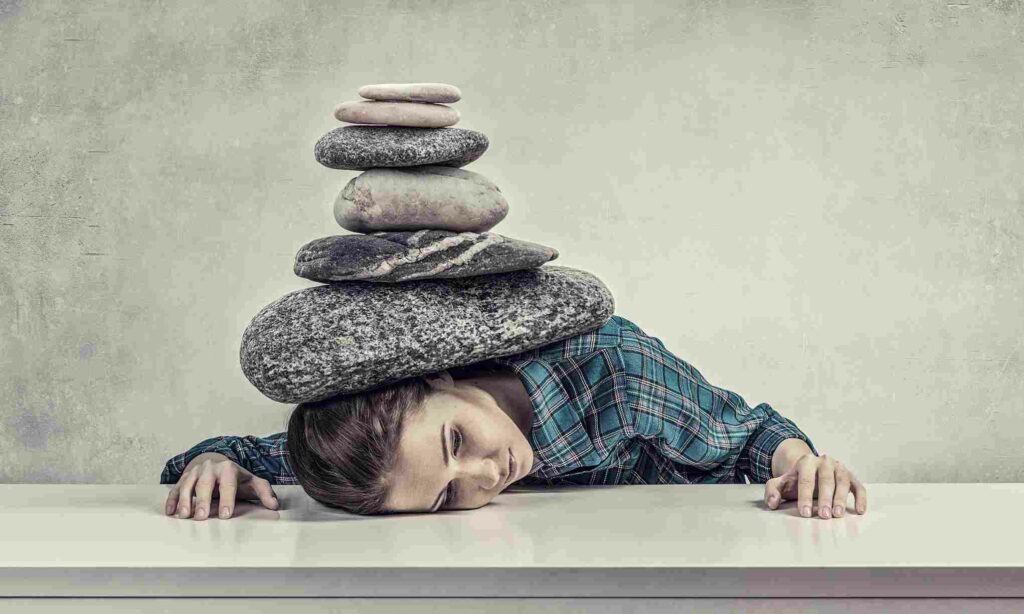Depression fatigue is a common symptom of depression. It can make it difficult to get out of bed in the morning and can cause you to feel exhausted even after a full night’s sleep. If you are experiencing this condition, there are steps you can take to manage it. In this blog post, we will discuss what depression fatigue is, and how you can deal with it.
Contents
What Is Depression Fatigue?
 Depression fatigue is a type of physical and mental exhaustion that can be caused by various factors, including but not limited to: chronic stress, poor sleep habits, an unhealthy diet, and certain medical conditions. While depression itself can be exhausting, the condition can also lead to other issues that contribute to fatigue.
Depression fatigue is a type of physical and mental exhaustion that can be caused by various factors, including but not limited to: chronic stress, poor sleep habits, an unhealthy diet, and certain medical conditions. While depression itself can be exhausting, the condition can also lead to other issues that contribute to fatigue.
This condition is often characterized by a feeling of being constantly tired, even after getting a full night’s sleep. It can also cause difficulty concentrating, decreased motivation, and apathy. This condition can make it hard to carry out everyday tasks and enjoy activities that were once pleasurable.
Therefore, it’s important to be aware of the signs and symptoms of depression fatigue in order to seek treatment early. Otherwise, this can be a debilitating condition that significantly impacts your quality of life.
How Does It Look Like?
There are different ways that depression fatigue can manifest itself. For some people, it may look like feeling tired all the time, even after a full night’s sleep. Others may find that their motivation and energy levels are significantly lower than usual. And still, others may experience both physical and mental fatigue.
In some cases, depression fatigue can be so severe that it leads to what’s known as “psychomotor retardation.” This is when a person’s movements and speech slow down significantly. Psychomotor retardation can make it difficult to carry out even the simplest tasks.
Some common signs of depression fatigue include:
- Decreased interest in activities that used to be enjoyable
- Overwhelming most of the time
- Low energy levels
- Reduced motivation
- Difficulty concentrating
- Low self-esteem
If you’re experiencing any of these symptoms, it’s important to talk to your doctor. Depression fatigue is a real medical condition that can be effectively treated.
Is Fatigue A Form Of Depression?
 Many people with depression report feeling fatigued. In fact, fatigue is one of the most common symptoms of depression. Fatigue can be physical, mental, or both. It can make you feel like you don’t have the energy to do anything or that everything takes twice as much effort as it normally would.
Many people with depression report feeling fatigued. In fact, fatigue is one of the most common symptoms of depression. Fatigue can be physical, mental, or both. It can make you feel like you don’t have the energy to do anything or that everything takes twice as much effort as it normally would.
Depression and fatigue are also both common in other conditions, such as anxiety disorders, so it can be hard to know which is which. Some theories suggest fatigue as a form of depression to a great extent. It is not clear whether fatigue leads to depression or vice versa. But it is known that they are both interconnected.
So you should not be surprised if you are feeling fatigued along with your depression. It is a very common symptom. But with time you can manage this condition so do not feel disheartened.
How Depression And Fatigue Are Related?
Now how depression and fatigue are related? Depression can cause fatigue, and fatigue can cause depression. It’s a chicken-and-egg situation. But there are some key ways that they’re linked:
Depression zaps your energy. When you’re depressed, it takes more effort to do things. Even getting out of bed in the morning can feel impossible. When you’re depressed, your body doesn’t have the same level of energy as it does when you’re not depressed.
Fatigue makes it harder to concentrate. When you’re tired, it’s hard to focus on anything. You may find yourself having trouble finishing tasks at work or school, or you may have a hard time following conversations.
Fatigue can be a symptom of depression. Fatigue is one of the most common symptoms of depression. It’s also one of the first symptoms to appear. If you’re feeling unusually tired all the time, it could be a sign that you’re depressed.
Depression can make fatigue worse. If you’re already feeling fatigued, depression can make it even harder to get through the day. Depression can also cause insomnia, which can make fatigue worse.
So in this way, both depression and fatigue can make the other one worse. And both are interlinked to a larger extent. Hence you should never ignore either of them and see a doctor as soon as possible.
What Are The Consequences?
 There are a number of consequences that can come from depression fatigue. These include:
There are a number of consequences that can come from depression fatigue. These include:
- Trouble concentrating
- Memory problems
- Problems making decisions
- Irritability
- Increased anxiety
- A feeling of hopelessness
- A loss of interest in activities that you once enjoyed
- Social withdrawal
These negative impacts can cause serious problems in your life, both at home and at work. Depression fatigue can make it difficult to function in your everyday life, which can lead to further isolation and feelings of despair.
If you’re struggling with this condition, it’s important to seek help from a mental health professional. With treatment, you can learn how to manage your fatigue and regain your energy and enthusiasm for life.
How Do I Recover From Depression Fatigue?
If you’re struggling with depression fatigue, know that you’re not alone. Depression is a very real and very common illness, and it can take a toll on your energy levels, motivation, and overall outlook on life. But the good news is that there are things you can do to recover from this condition.
Here are some tips:
Talk to your loved ones
If you’re feeling isolated and alone, reaching out to your loved ones can be a huge help. Talking to someone who cares about you and wants to support you can make a world of difference. Because when you share your feelings and experiences with someone, it can help you feel less alone and more understood.
Get some exercise
Exercise is a great way to combat depression and fatigue. It releases endorphins, which have mood-boosting effects. A moderate amount of exercise is the key to getting these benefits without making your fatigue worse. Start by doing some light exercises, like walking or yoga. If you can, work up to more strenuous activities like running or lifting weights.
Get enough sleep
This may seem impossible when you’re struggling with depression, but enough sleep is crucial for managing depression fatigue. Shoot for at least seven hours a night. If you can’t get enough shut-eye at night, try taking a power nap during the day. Because when you sleep, your body gets a chance to restore itself. With more energy, you’ll be better equipped to handle the fatigue that comes with depression.
Indulge in hobbies
 It is important to indulge in some hobbies as it can help to take the mind off of negative thoughts and improve one’s mood. Some examples of hobbies that can be beneficial for those with this condition are painting, gardening, hiking, biking, and playing sports. When you have this condition, it is easy to want to just stay in bed all day and do nothing. However, participating in hobbies can help increase energy levels and motivation.
It is important to indulge in some hobbies as it can help to take the mind off of negative thoughts and improve one’s mood. Some examples of hobbies that can be beneficial for those with this condition are painting, gardening, hiking, biking, and playing sports. When you have this condition, it is easy to want to just stay in bed all day and do nothing. However, participating in hobbies can help increase energy levels and motivation.
Practice relaxation techniques
Relaxation techniques can be very helpful in managing depression fatigue. Relaxation techniques can include things like yoga, meditation, and deep breathing exercises. These activities can help to reduce stress and improve your overall mood. Because these techniques can be done anywhere, they can be very convenient and easy to do.
Create a routine
People with depression often struggle with fatigue. One of the best ways to combat this is to create a routine and stick to it as much as possible. This means getting up at the same time every day, eating regular meals, and participating in activities that you enjoy.
Of course, there will be days when you just don’t feel like doing anything. That’s okay. On those days, try to do something that is low-key and doesn’t require a lot of energy. For example, you could read a book, take a bath, or go for a walk.
Avoid stimulants
Depression can be triggered by stimulants like caffeine and nicotine, so it’s important to avoid them. Instead, try to relax with herbal teas or decaffeinated beverages. It is also believed that sugar can worsen depression, so it’s best to avoid sugary foods and drinks. For example, when you’re feeling down, instead of reaching for a candy bar or a soda, try eating some fruit or drinking water.
So these are a few things that you can do to help with this condition. Remember, it’s important to talk to your doctor if you are feeling depressed so they can help you find the best treatment plan for you. If you think you may be suffering from depression, please don’t hesitate to reach out for help.
When To Seek Professional Help?
 This might be a difficult question to answer. Let’s discuss when should someone seek professional help for this condition.
This might be a difficult question to answer. Let’s discuss when should someone seek professional help for this condition.
Though depression and fatigue are common and often co-occur, they can be difficult to manage on your own. If you are struggling to cope with your symptoms, it may be time to seek professional help. There are a few key things to keep in mind when considering whether or not to seek professional help:
- Your fatigue is impacting your ability to function in your everyday life
- You have tried making lifestyle changes but they haven’t helped
- Your fatigue is accompanied by other symptoms, such as trouble sleeping, changes in appetite, or feelings of hopelessness
If any of these apply to you, it may be time to seek professional help. A therapist can help you manage your depression and fatigue, and develop a plan to improve your overall well-being.
There are many different treatment options available for depression and fatigue. If you’re not sure where to start, consider meeting with a therapist to discuss your options. With the right treatment, you can start feeling better and living a more enjoyable life.
Conclusion
To conclude, depression fatigue is often underdiagnosed and undertreated. If you think you might be suffering from it, please reach out to a mental health professional. With treatment, this can be managed and you can feel better. Always be willing to ask for help when you need it. And finally, don’t forget to take care of yourself.
Depression fatigue can be exhausting, but remember to schedule time for activities that make you happy and help you relax.
For more information and guidance, please contact Therapy Mantra. The team of experts here will be more than happy to help you out and get you on the path to a better life. Contact us today to learn more about our services. You can also book an online therapy session or download our free Android or iOS app.


